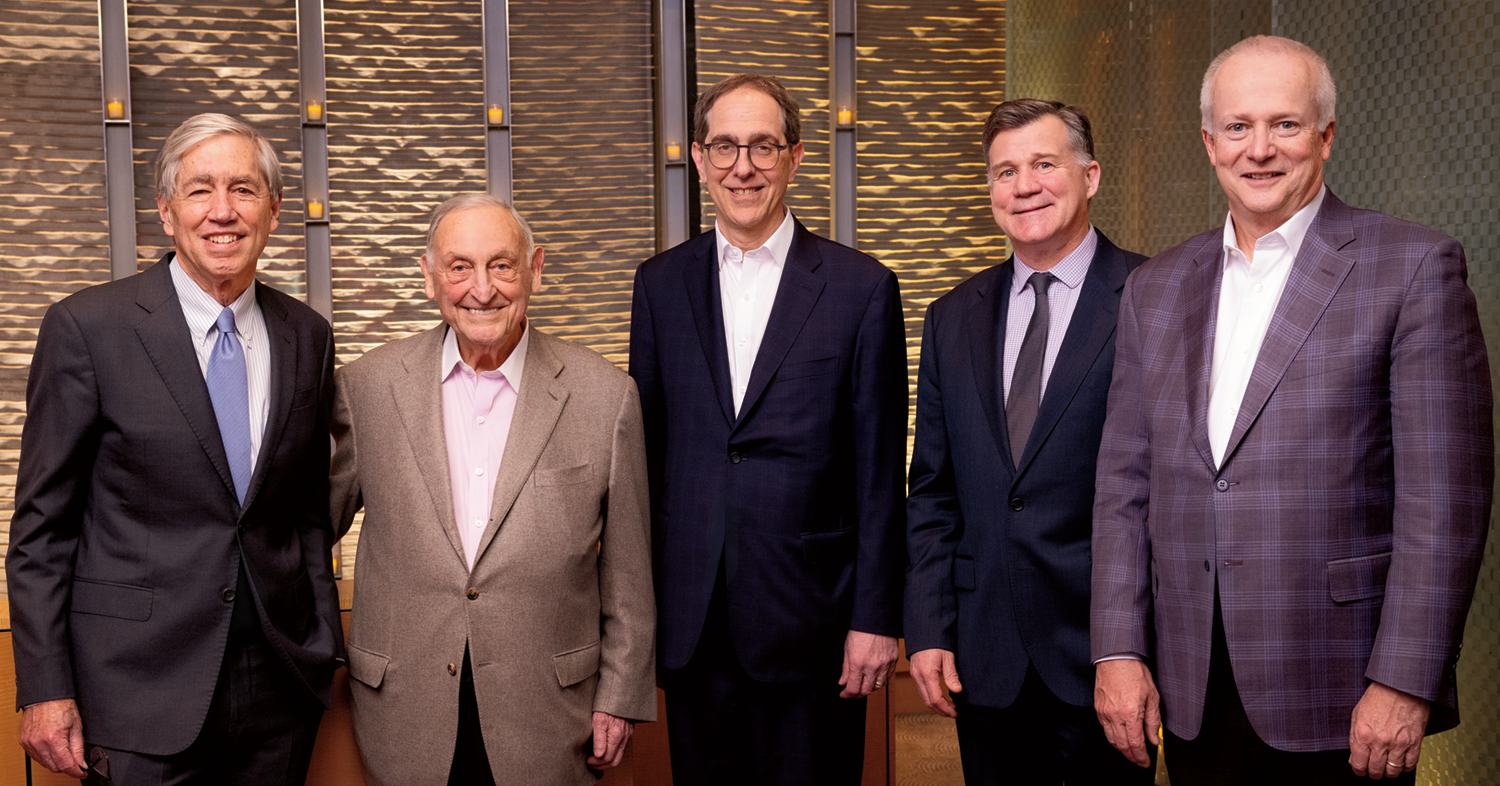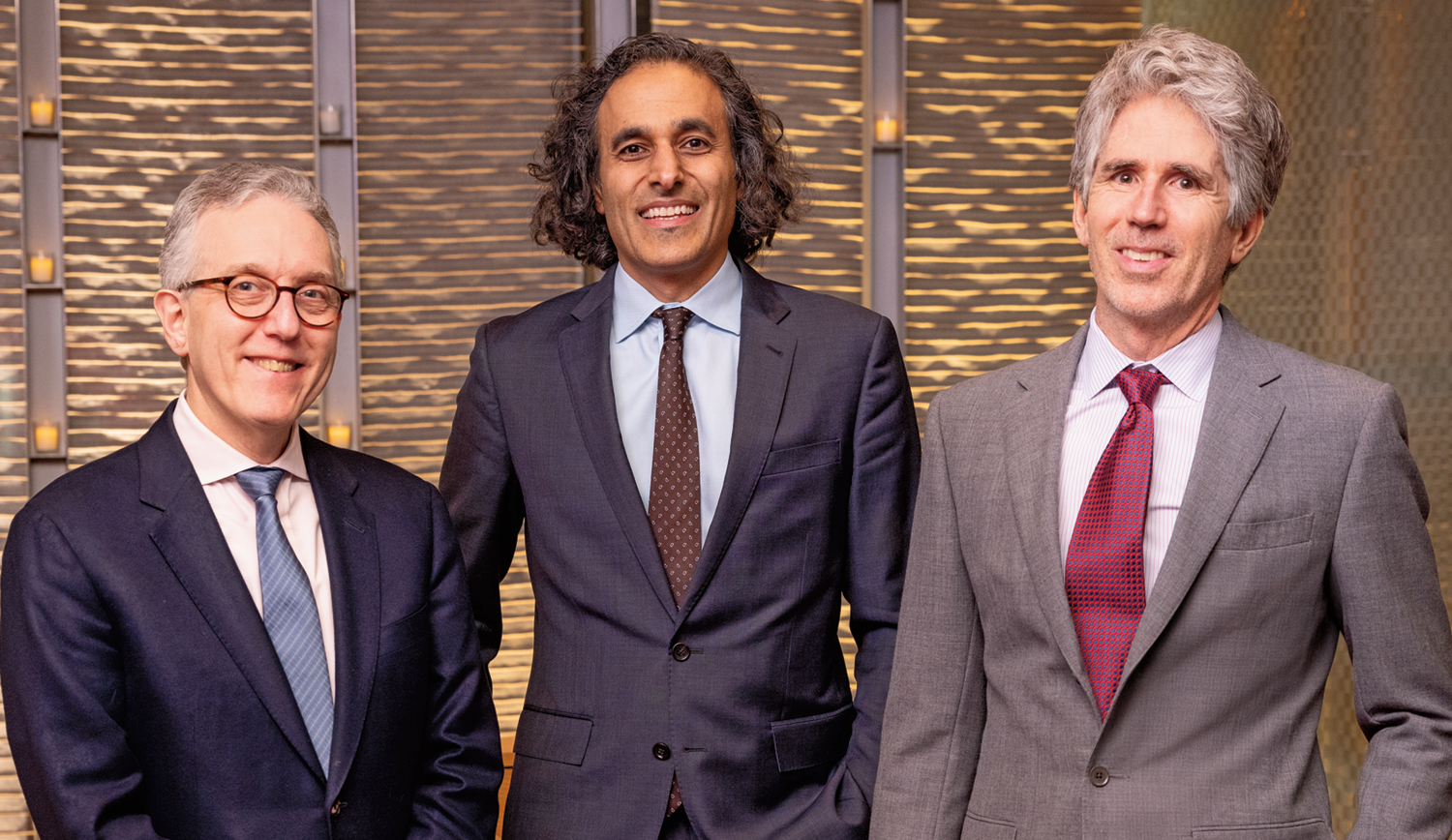
Dr. Richard Lifton, president of The Rockefeller University; Sanford I. Weill, founder of the Weill Family Foundation and chair emeritus of the Weill Cornell Medicine Board of Fellows; Christopher L. Eisgruber, president of Princeton University; Jonathan Skipper, president of the Ludwig Institute for Cancer Research; and Dr. Robert A. Harrington, the Stephen and Suzanne Weiss Dean of Weill Cornell Medicine
Dr. Richard Lifton, president of The Rockefeller University; Sanford I. Weill, founder of the Weill Family Foundation and chair emeritus of the Weill Cornell Medicine Board of Fellows; Christopher L. Eisgruber, president of Princeton University; Jonathan Skipper, president of the Ludwig Institute for Cancer Research; and Dr. Robert A. Harrington, the Stephen and Suzanne Weiss Dean of Weill Cornell Medicine
Dr. Richard Lifton, president of The Rockefeller University; Sanford I. Weill, founder of the Weill Family Foundation and chair emeritus of the Weill Cornell Medicine Board of Fellows; Christopher L. Eisgruber, president of Princeton University; Jonathan Skipper, president of the Ludwig Institute for Cancer Research; and Dr. Robert A. Harrington, the Stephen and Suzanne Weiss Dean of Weill Cornell Medicine
With a mission to understand how nutrition and metabolism impact the body’s ability to control cancer, four leading research institutions have united under the Weill Cancer Hub East, an innovative, collaborative partnership that aims to transform cancer treatment.
The new initiative connects world-class experts from Princeton University, The Rockefeller University, Weill Cornell Medicine’s Meyer Cancer Center and the Ludwig Institute for Cancer Research to examine how nutrition and metabolism can enhance a therapeutic strategy known as immunotherapy that harnesses a patient’s own immune cells to treat cancer. Immunotherapy holds much promise, but its effectiveness varies in different people and against different types of cancer.
The Weill Cancer Hub East was established with a transformational $50 million gift from the Weill Family Foundation, directed by visionary benefactors Joan and Board of Fellows Chair Emeritus Sanford I. Weill, and was matched with philanthropy from each of the three partner institutions that together will total more than $125 million.
The initiative seeks to break down institutional barriers and unite top experts in cancer biology, cancer clinical trials, immunology, nutrition and metabolism to drive pioneering, cross-field collaboration that pushes the boundaries of scientific discovery.
“The Weill Cancer Hub East will offer doctors and scientists a tremendous opportunity to revolutionize the treatment of cancer, a disease that complicates so many lives,” says Mr. Weill, founder of the Weill Family Foundation. “With the best minds in the field armed with the most advanced research techniques, the Weill Cancer Hub East will seek to elevate immunotherapy and improve patient care for people battling cancer. Joan and I could not be more excited about the endless possibilities of this special partnership – investment in science and medicine is our labor of love.”
The Weill family and the Weill Family Foundation have long championed the advancement of exceptional science and medicine, and with this gift continue to cement their legacy as Weill Cornell Medicine’s foremost benefactors. In total, the Weill family and the Weill Family Foundation have gifted more than $1 billion to nonprofit organizations in the United States and worldwide, supporting areas ranging from education, social causes, music and the arts to medical research and patient care.

Researchers Dr. Jedd Wolchok of Weill Cornell Medicine, Dr. Sohail Tavazoie of The Rockefeller University and Dr. Joshua Rabinowitz of Princeton University and Ludwig Institute for Cancer Research
Over the next decade, the Weill Cancer Hub East will marshal multidisciplinary teams to explore the complex relationship between solid tumors and the environment in which they form and grow. Their investigations will leverage the complementary strengths of each research institution to illuminate how the food we eat and the beneficial microbes that help metabolize that food influence the effectiveness of cancer treatments such as immunotherapy.
At Weill Cornell Medicine, the Hub’s scientific activities will be led by Dr. Jedd Wolchok, the Meyer Director of the Sandra and Edward Meyer Cancer Center, co-director of the Ludwig Collaborative Laboratory and co-director of the Parker Institute for Cancer Immunology at Weill Cornell Medicine. Dr. Wolchok will lead a team of expert physician-scientists in the fields of cancer and nutrition, including outstanding faculty in the Meyer Cancer Center and the Friedman Center for Human Nutrition.
Cutting-Edge Research to Enhance Immunotherapy
Heralded as the “fifth pillar” alongside surgery, radiation, chemotherapy and precision-targeted therapeutics, immunotherapy is a powerful approach for many types of cancers. While the other therapies attempt to remove or attack cancer cells directly, immunotherapy utilizes a patient’s own immune system to strike the disease from within.
“How we can increase the effectiveness of immunotherapy across all cancer types and patients is one of the scientific questions that most needs answering,” says Dr. Robert A. Harrington, the Stephen and Suzanne Weiss Dean of Weill Cornell Medicine.
“By convening world-class institutions with leading investigators in their respective fields, including those at our Meyer Cancer Center, the Weill Cancer Hub East seeks to discover new ways that nutrition and gut microbes can improve the immune response to the disease. This initiative is a testament to the power of philanthropy to advance science and medicine, and we are profoundly appreciative of Joan, Sandy and the Weill Family Foundation for their out-of-the-box, visionary commitment.”
Using the latest advances in metabolomics, immunology, computational analysis and artificial intelligence, the Weill Cancer Hub East will explore how metabolism affects the immune system’s ability to recognize and control cancer.
The hub will offer seed funding to basic, clinical and translational scientists from Princeton University, The Rockefeller University and Weill Cornell Medicine to pursue collaborative projects that focus on reprogramming the tumor microenvironment and augmenting cell function by modulating patients’ metabolism and microbiomes.
The hub will also offer a portfolio of clinical trials, including those that explore whether GLP-1 agonists, which are designed to modify a person’s metabolism, have downstream beneficial effects on a cancer patient’s immune response and outcome. Findings gleaned from these investigations may have applications in cardiovascular, metabolic and autoimmune conditions.
A leadership committee, comprising leaders from Princeton, Rockefeller, Weill Cornell Medicine and Ludwig, along with representatives from the Weill Family Foundation, will direct the hub’s scientific strategy. Licensed discoveries with commercial potential will provide further financial support for the hub, as will ongoing philanthropy from each of the three academic institutions.
“The Weill Cancer Hub East has enormous potential to transform the way we treat cancer and change the world,” says Mr. Weill. “Joan and I can’t wait to see all of the innovations that emerge from the initiative.”
